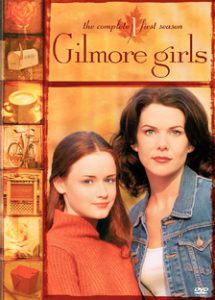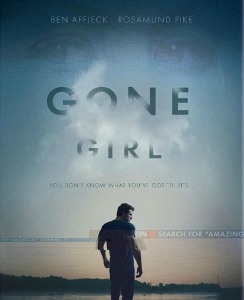Since it’s the latest film from director David Fincher, who has a stylish knack for capturing the gritty essence of neighborhoods and bars and police stations, I recommend seeing “Gone Girl,”albeit in the cheap theater or when it gets to Redbox. At the same time, this marks Fincher’s second-straight adaptation of a mainstream beach read, following 2011’s “The Girl with the Dragon Tattoo,” making me concerned that he can’t find meaty subject matter like “Fight Club,” “Zodiac,” “The Curious Case of Benjamin Button” and “The Social Network” anymore.
Benefiting from Fincher’s direction, Trent Reznor’s mood-setting score and a crisp, if flawed, script by former Entertainment Weekly writer Gillian Flynn (adapting her own novel), the St. Louis-set “Gone Girl” holds one’s attention. But there’s a hollowness at its core. Ben Affleck’s Nick Dunne is sympathetic because of what’s happening to him – he’s accused of killing his missing wife and hounded by the press – but not because of many likable traits. Nick’s sister, Margo (Carrie Coon) has some zest to her, as does lead detective Rhonda Boney (Kim Dickens), who looks beyond the surface more than her idiot junior partner Jim Gilpin (Patrick Fugit). Tyler Perry’s Tanner Bolt is a scene-stealing defense lawyer. And the title character, Rosamund Pike’s Amy Dunne – like her husband, a laid-off magazine scribe — is, well, interesting.
While it falls short in the character department, “Gone Girl” does function as a commentary on the horrors of media scrutiny – Missi Pyle’s Ellen Abbott is a terrifying Nancy Grace stand-in — and the high monetary cost of defending yourself, even if you’re innocent.
The rest of my review will be rife with SPOILERS, so stop reading here if you haven’t seen the film yet.
As I said, Amy is interesting. We learn about halfway through the film that she’s a brilliant sociopath, perhaps helped down that path by her dad’s “Amazing Amy” children’s books, which improved upon Amy’s actual life. At this point, “Gone Girl” transforms from a pseudo-murder mystery into a character study of the villain. Pike’s performance is on the cold side, but she commits to the role physically, gaining weight to change her appearance when she’s off the grid.
I’m not usually one to criticize a film’s ending, as I think movies are more about the journey than the destination, but it has to be noted that “Gone Girl” utterly fails to stick its landing. I haven’t read the book, so perhaps Flynn’s written word does a good job of conveying why Nick opts to continue to live with Amy, rather than get a divorce, after he knows what she did (framing Nick, killing one former boyfriend, and ruining the life of another with a staged rape).
But the script and Affleck’s performance don’t sell this angle at all. At one point, Nick runs the bathroom faucet loudly so his wife won’t overhear and practices his speech to reporters where he reveals Amy’s crimes. Nick should’ve actually done this, or at least made a statement to the police. Even if he’s more concerned about his future child at this point, getting the police to continue their investigation of Amy is the right way to play it. At 2 ½ hours, “Gone Girl” is long enough that you’ll start feeling that large Coke Zero in the final act, and we deserve to see a villain of this caliber get what’s coming to her. I understand that sometimes the bad guy wins, and indeed that can be the point of a film, but it’s nonsensical here.

“Gone Girl” crumbles under post-viewing scrutiny in other ways, too. Detective Boney is initially good at looking beyond the surface – noting the convenient envelopes of clues and the unburned diary — and feels like Nick is being framed. Then she comes across the most blatant step in Amy’s frame job – Margo’s shed being packed with fresh-from-the-store goods that Amy racked up on Nick’s credit card to create a financial motive – and that’s when she’s ready to charge Nick with murder, without even listening to Nick’s side of the story.
Despite the plot conveniences and the unsatisfying ending, “Gone Girl” is engaging on the first viewing, thanks largely to the seemingly effortless touch of Fincher. And while it’s far from perfect, Flynn’s plotting is imaginative, and she also smartly jabs the mainstream media and those who consume it. As her career progresses, she’ll be one to watch.

